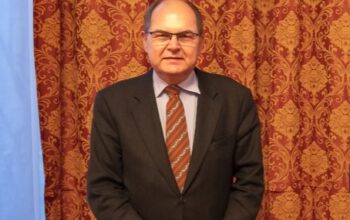The European Union is rightly losing patience with BiH’s failure to amend its Constitution to comply with the European Court of Human Rights’ 2009 decision in Sejdic and Finci v. BiH. Yet key Bosniak politicians, backed by some foreign diplomats, are blocking implementation of the decision by demanding a fanciful “symmetry” that has nothing to do with human rights.
Sejdić-Finci held that the European Convention on Human Rights forbids limiting eligibility for election to BiH’s Presidency and House of Peoples to BiH’s three Constituent Peoples. The BiH Presidency comprises one Serb member elected from Republika Srpska (RS) and two members—one Bosniak and one Croat—elected from BiH’s other Entity, the Federation. The BiH House of Peoples is composed of five Serbs elected by the RS National Assembly, five Bosniaks elected by the Bosniak delegates to the Federation House of Peoples, and five Croats elected by the Croat delegates to the Federation House of Peoples.
The European Court of Human Rights did not fault these systems’ asymmetries, which are inherent in BiH’s power-sharing constitutional structure. The Court only disapproved of ethnicity-based limitations on eligibility for election.
The RS Proposal
The RS proposal removes ethnic qualifications from the RS member of the Presidency and the RS members of the House of Peoples. The RS will accept whatever solution the Federation’s Bosniak and Croat parties reach with respect to the Federation’s members of the Presidency and the House of Peoples.
The RS’s proposed solution has earned the praise of the two plaintiffs in the case, Dervo Sejdić and Jakob Finci. President Dodik told Sejdić and Finci that the RS was ready to immediately enter into a procedure to amend the BiH Constitution to bring BiH into compliance with the decision. Once the Federation’s main Bosniak and Croat political parties agree to a resolution with respect to the members of the Presidency and House of Peoples from the Federation, BiH can immediately amend its Constitution to implement the decision.
A Needless Barrier to Agreement
Unfortunately, some Bosniak politicians and their foreign supporters are trying to erect an artificial and gratuitous barrier to implementing Sejdić-Finci: they demand that any solution be “symmetrical” but fail to explain why this is necessary—or how it is even possible—in BiH’s asymmetric, power-sharing constitutional structure.
BiH’s constitutional structure, with two Entities and three Constituent Peoples, is asymmetric by its very nature. BiH’s three-member Presidency and House of Peoples are indispensible to BiH’s constitutional structure because they help prevent a Constituent People from being dominated by one or both of the other Constituent Peoples. As long as there are three members of the Presidency and only two Entities, differences in the way the members of the Presidency are chosen are unavoidable; the election of a single member of the Presidency by one Entity is necessarily different from the election of two members by the other Entity. Asymmetry is similarly unavoidable in the election of members of the House of Peoples.
Bosniak politicians’ demand for symmetry is impossible to achieve, wholly unnecessary, and irrelevant to the Sejdić-Finci decision.
Asymmetric Election Systems are Widespread
BiH is hardly alone in its use of asymmetric election systems. The use of different methods to elect members of the same political body is common in democratic systems around the world. In Germany, for example, some members of the Bundestag are directly elected, others are elected as part of a national party list, and still other members, from certain states, are elected through unique methods. In many democratic countries, different members of the same political body are chosen through different means. These countries include, among others, Italy, New Zealand, the United Kingdom (Scottish Parliament), Hungary, Japan, Lithuania, and South Korea. Members of the EU Parliament are elected through widely varying systems designed by the state they represent.
The RS has proposed a simple and effective solution for satisfying the Sejdić-Finci decision with respect to the RS members of the Presidency and House of Peoples. If implementing Sejdić-Finci is more complicated with respect to members from the Federation, that does not mean the solution must be equally complicated with respect to members from the RS. It is long past time for BiH to amend its Constitution to bring it into line with the Sejdić-Finci decision. Foreign officials should decline to help Bosniak politicians set up an artificial roadblock to implementation.


